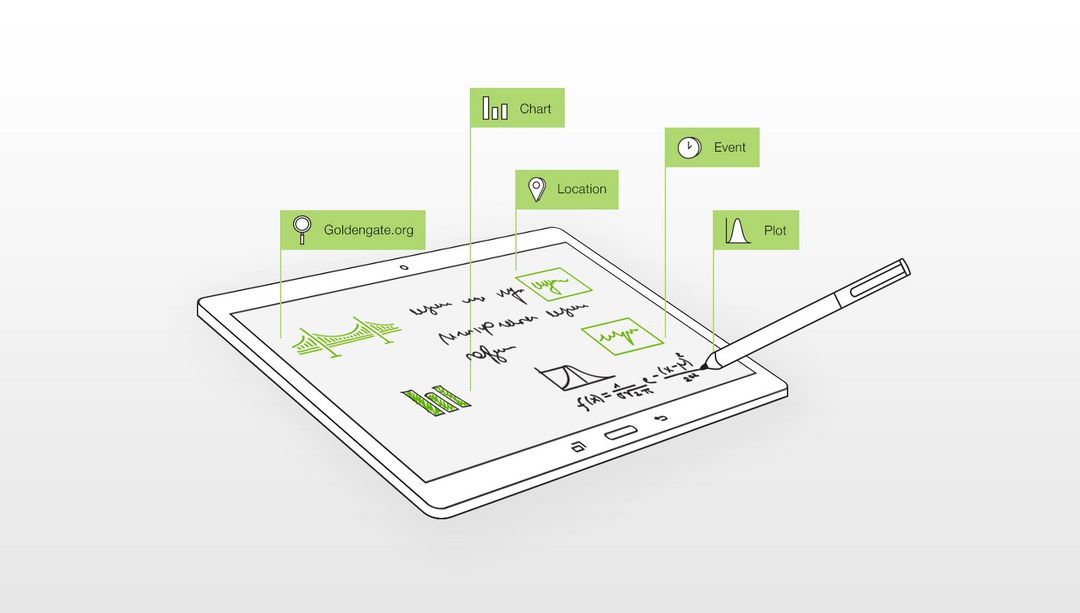Today's flood of data leads to the fact that the many pieces of information surrounding us are hardly manageable for the individual: Documents are stored in extensive folder structures, e-mails arrive almost every minute, notes on important meeting contents are recorded in handwriting and disappear in the note pad or in a stack of paper. Thus, a knowledge management system is required that considers the specific working styles of the individual and embeds individual work artefacts into the personal information space and into the corporate memory. Furthermore, it needs to proactively offer further information on the current context or problem from relevant sources.
Digital ink and knowledge management form a symbiosis
The Japanese manufacturer of input tablets and digital pens, Wacom, and the research department “Smart Data & Knowledge Services” of the German Research Center for Artificial Intelligence (DFKI) are jointly dedicated to this challenge. Both are involved in the Digital Stationery Consortium (DSC), an association that aims to establish digital ink as a universal, open and intelligent content format and to develop common ideas and future applications.
Wacom has contributed its key technology for displaying digital ink, the “Wacom Ink Layer Language (WILLTM)”, to the cooperation. The WILLTM standard can be used to record and display personal, digital handwriting across platforms and applications. The technology that enriches the previously digitized notes with personal, company-internal as well as publicly accessible knowledge is based on “Corporate Memory”, a knowledge management system from DFKI. The scientists have been researching and implementing solutions in research and industrial projects for years to effectively integrate knowledge management into daily work, to gain knowledge contextually with little effort and to make it available in a demand-oriented manner.
Proactive preparation of digitalized fonts replaces time-consuming searches
In the proof of concept (PoC) developed jointly with Wacom, the employee notes down information using a digital pen. On this basis, CoMem proactively provides information – such as contact data for noted persons, relevant entries from the personal calendar or context-related documents of the user, team or company. Furthermore, this artefact is now embedded into user’s PIMO and – if shared – also part of the corporate memory.
“The symbiosis of WILLTM technology and CoMem knowledge management system transforms a purely handwritten document into a document with real added value,” says Prof. Dr. Andreas Dengel, head of the Smart Data & Knowledge Services research department at DFKI. “All too often, notes on thoughts, concepts or meetings are forgotten, despite their immense information content. Our jointly developed system counteracts that by integrating important content of manually created documents into a corporate memory and automatically connecting to resources by means of a knowledge graph. At the same time, the user is offered context-relevant and related knowledge from the user’s PIMO and the corporate memory as well as freely accessible sources such as Wikipedia to solve the problem,” continues Dengel.
The time-consuming search for relevant information on servers, desktop folders or the most diverse applications will hopefully soon be a matter of the past.
Enrichment of everyday office life through CoMem
The cooperation with Wacom extends the integration of CoMem into the personal working environment of users and thus follows the approach of the Semantic Desktop which integrates knowledge management into applications such as e-mail, browser and file system. Thus, the semantic notes previously written in text editors can now be extended by handwritten notes – with digital ink on paper or tablets – and thus cover further work situations of users. CoMem is already in use as an independent and comprehensive knowledge management system within DFKI and is currently finding its way into industry.
The joint development was presented for the first time at the Samsung Developer Conference in San Francisco from 7 to 8 November 2018. As the next stop, Wacom will demonstrate the demo during Connected Ink in Tokyo on November 30, 2018.
About DSC
Founded by Wacom, The Digital Stationery Consortium is an association of global industries and thought leaders with the shared mission to advocate the value of human creativity and to lead the creation of a new market category of smart digital stationery solutions that are serving any creative minds in a most natural and intuitive way. The consortium’s focus is to establish digital ink as a universal, open and smart content format and a common framework for sharing and collaborating with ideas based on WILL™ digital ink. For more information about DSC and its membership benefits, please visit https://digitalstationeryconsortium.org/
About Wacom
Founded in 1983, Wacom is a global company based in Japan with subsidiaries and affiliate offices around the world to support marketing and distribution in over 150 countries and areas. It is the world’s leading manufacturer of pen tablets, interactive pen displays, and digital interface solutions. The advanced technology of Wacom’s intuitive input devices has been used to create some of the most exciting digital art, films, special effects, fashion and designs around the world and provides business and home users with their leading interface technology to express their personality. The company also offers its products as OEM solutions to leading manufacturers serving incremental markets. Wacom’s interface technology, called Wacom Feel IT technologies, is also offered as an integrated solution to strategic partners. Most tablet device and PC manufacturers count on the advanced features and reliability to deliver a superior user interface experience. www.wacom.com

